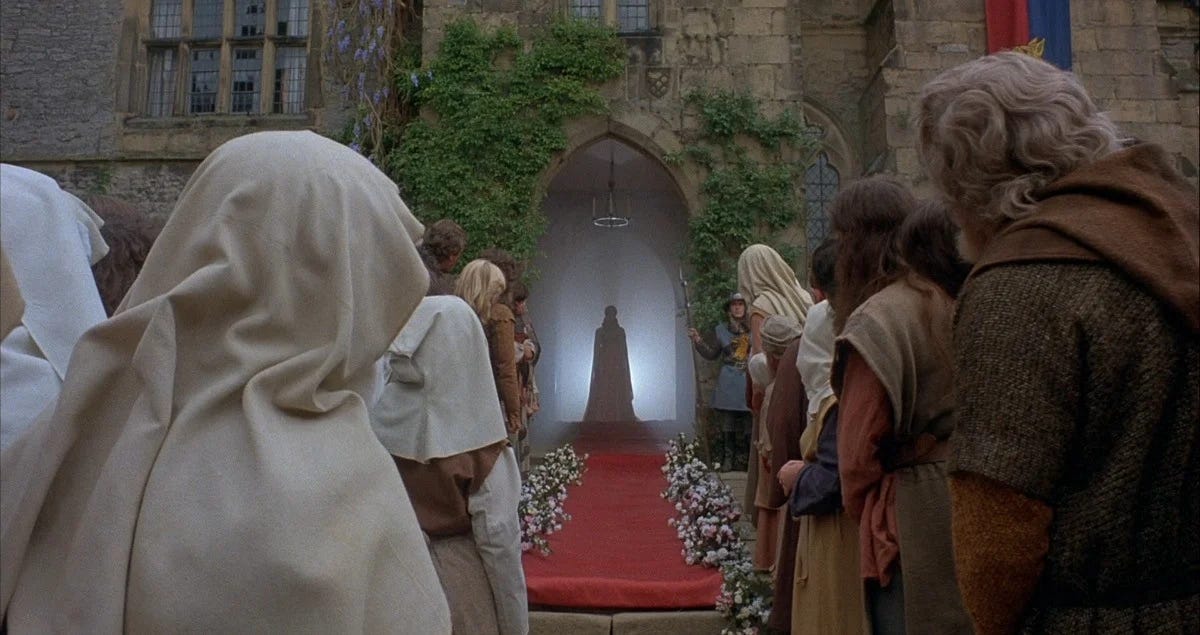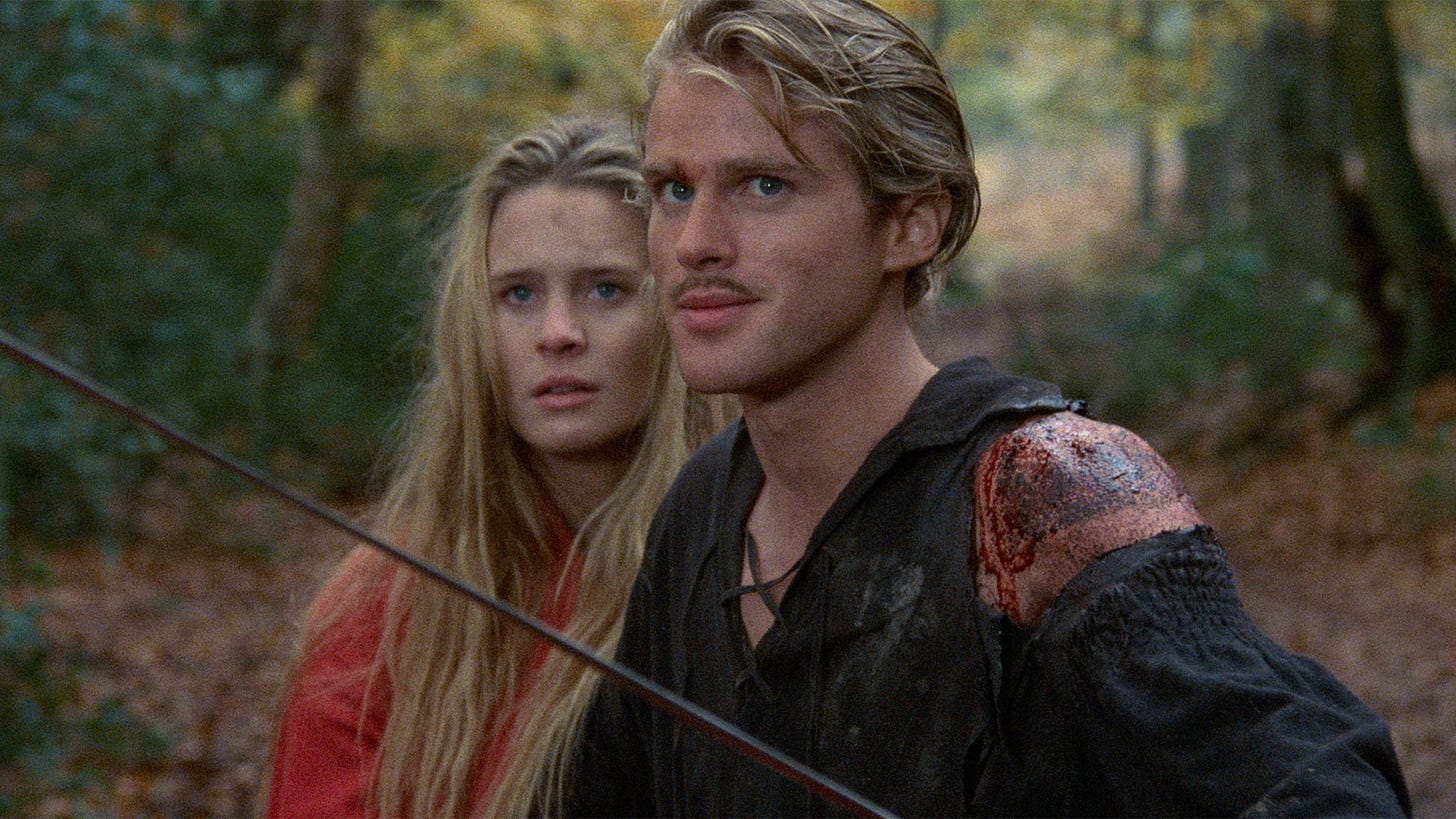100 Movies Every Catholic Should See #48: The Princess Bride (1987)
Directed by Rob Reiner. Written by William Goldman.
Fencing, fighting, torture, revenge, giants, monsters, chases, escapes, true love, miracles…
You had to know this one was coming.
Love it or hate it (but does anyone hate it? Really?) This movie is a staple in the average family movie cabinet, and its iconic collection of quotable lines finds itself to be a staple in bar trivia, bumper stickers, wedding ring inscriptions, and our own vocabularies (to that point, has anyone ever said the word ‘inconceivable' in a normal tone?)
This movie is an enduring classic in every sense of the term. It captures the sense of childlike nostalgia of being read fairy tales and love stories and adventures as a kid, complete with interruptions and commentary provided helpfully by an actual child in real time.
Anyone who has attempted to read a beloved book to a small child can sympathize with the grandfather (played by the great Peter Falk) as he reads The Princess Bride to his sick grandson (Fred Savage) in the framing sequences of the film. Younger audience members agree with the grandson as he gets annoyed and bored by kissing scenes and exposition, and they too want to skip to the sword fights, giant fights, and battles of wits. Older audience members admire the grandfather’s patience as he gracefully handles the initial resistance and then cultivates the growing interest and interruptions flying his way. And this dynamic works, because this is a movie meant for families to watch together.
Part of this is because the film exists on two levels: First as a fairy tale love and adventure story, and the other as a tongue-in-cheek parody of itself. Our hero is hyperbolically capable, our villains are hyperbolically villainous. The hyperbolic side-characters steal every scene they touch, dialing up their roles to maximum capacity. Simple enough for kids to follow; clever enough for adults to enjoy, this film also slips in poignant themes of love, suffering, and redemption.
The film stems from a (highly recommended) book which itself stems from a bedtime story author and screenwriter William Goldman made up for his two young daughters, one of whom demanded a story about a princess, while the other insisted for a tale about a bride. Right out the gate this film was a labor of love: C.S Lewis would call it storge, or familial love (but more on that later).
A farm boy and a beautiful maiden (played by Cary Elwes and Robin Wright, the latter in her film debut) are in love, but a series of trials, tribulations, hijinks and sufferings must come first. The boy and maiden will grow and change through their sufferings, ultimately becoming a far improved version of themselves, all while meeting an eclectic cast of characters along the way. These are classic, tried and true elements of a fairy tale love story. So far every box is checked.
What brings Princess Bride to the level of greatness is the pervasive dry wit, straight-faced delivery, and some of the best dialogue put to film. Director Rob Reiner spent countless hours working with Goldman to develop the humanity of the characters, as well as to encourage camaraderie and rapport with his cast. Cary Elwes relates in his memoir that many, many takes were ruined due to the cast bursting into uncontrollable laughter mid-scene, and Mandy Patinkin (Inigo Montoya) even bruised a rib attempting to hold in his laughter watching Billy Crystal work his magic as Miracle Max. With so much gaiety backstage, the charm inevitably spills over into the finished product. Not surprisingly, the driving force of the film, the plot, and the characters' motivations is love. Love has the power to change hearts, change minds, and even thwart death. In a lesser production, this sickly-sweet force may be hard to swallow, but The Princess Bride carries with it a chocolate coating in the form of a certain cynical snark to make it all go down easier.
But like in any good fairy tale, to earn a happy ending there must be suffering and sacrifice. The film does not shy away from this idea, and as such the characters go through intense mental and physical suffering, making it clear that, in the iconic words of the Man in Black:
Life is pain, Highness. Anyone who says differently is selling something.
Quips aside, the movie makes it clear that suffering has a purpose. Count Rugen represents a distortion of this idea - as he is fascinated by causing and studying pain for its own sake. Rather, the film uses suffering to mature the characters, shaping them into who they are and preparing them for what lies ahead. St. Paul encourages this understanding of suffering, urging us to consider trials as being united in Christ, strengthened through grace and trusting that the suffering has a purpose beyond the scope of our imperfect understanding.
He said to me, ‘My grace is sufficient for you, for my power is made perfect in weakness.’…For the sake of Christ, then, I am content with weaknesses, insults, hardships, persecutions, and calamities; for when I am weak then I am strong (2 Corinthians 12:7-10).
On a similar note, Christian bloggers have fought a good fight portraying Westley as a Christ-like figure, who, in the spirit of sacrificial love, was subjected to unbearable pain, killed, and raised from the dead (as it were.) Indeed, we can harvest the low hanging themes of redemption and rebirth that are prevalent throughout the film and call it a day, but that is merely one aspect of the application of love throughout the movie.
Far be it from ‘100 Movies’ to be so reductionist as to claim that the movie's main theme is simply “love”. That would be like saying Van Gogh’s Starry Night is simply “blue”. Oh no- there are shades. There are individual parts that swell the beauty of the whole. Sprinkled throughout the film are copious examples of different kinds of love, and there is no better writer than our dear friend C.S Lewis to categorize four distinct kinds of loves for our analytical pleasure.
Eros (romantic love) is easy to find. Buttercup and Westley are hopelessly in love - with Westley pushing himself to the limit to be with the woman he loves, and Buttercup likewise sacrificing everything to be with him, to that end pushing away her crown, her security, and her fiancé (Prince Humperdinck, played with immeasurable dignity by Chris Sarandon). Buttercup's feelings towards Westley exemplify the romantic love that is lacking in Buttercup’s feelings toward Humperdinck, and Humperdinck is lacking for her. Eros is enduring even throughout years of separation, it cannot be faked, cannot be forced - thwarted not even by rushed wedding vows.
“This is true love. Do you think this happens every day?”
While the movie claims to be primarily a love (and therefore, eros) story, storge (familial love) is the more poignant. After all, the origin of The Princess Bride was a gift of love from a father to his daughters, and that pervades the film. Each moment the grandfather spends in the framing sequences is a testament to the love of family: spending time with his sick grandson sharing something treasured. In addition to that, the most wrenching plot-line in the film is of Inigo Montoya, driven by the love of his murdered father, pushing himself to breaking to honor his memory and make him proud. After all Inigo went through- drowning in his grief, alcoholism and obsession with revenge, when he claws his way to success, he finds that when he finally achieves his goal, all he ever truly wanted was his father back.
Clearly the philia award (love of friendship and brotherhood) goes to Inigo, Fezzik (endearingly performed by Andre the Giant in what he called the highlight of career), and eventually Westley for their escapades. Inigo and Fezzik look after each other, with Inigo encouraging Fezzik’s love of rhymes, and Fezzik lifting Inigo out of his alcoholism and depression (literally.) Aimless after the humorous death of their “handler” (but definitely not philia friend) Vizzini, they turn to the man that both defeated them but earned their respect, The man in black. They risk everything for a man they hardly know, but their shared goal unites them, their talents complementing each other's needs, blossoming into complete trust and respect.
The fourth and highest love is agape (the love of God for His children). The ultimate “As you wish’. The love of God to give us free will and love us through our faults and sufferings while we fight through all our own personal Fire Swamps and ROUS’s.
It's the “As You Wish” that transcends all “As You Wishes”: A perfect declaration of love that denotes both service and permission, assistance and allowance. “As You Wish” can be used in the passive sense to allow a thing to happen, “As You Wish” can be used in the active sense to denote a call to intervene on one’s behalf. We push God away, He steps back and says “As You Wish.” We crawl back as a broken prodigal Son and ask Him to take us back, He smiles and says “As You Wish”,
…which really means, “I Love You”.
The Princess Bride is a testament to the classic building blocks of what makes cinema great. Enduring characters, beautiful music, exciting landscapes, one-liners, sword fights, and heart. Sometimes, to qualify a movie as great, it really need only be a film that brings joy to the masses, and to that end, The Princess Bride has earned its spot on the list. It’s a movie of duality: both comedic and profound, both sincere and a parody, able to be enjoyed through the eyes of a child and the eyes of a grandfather. Pervasive through it all is a beautiful exhibition of different kinds of love, tied up succinctly in three powerful words. A savior for the indecisive wondering what to watch on a movie night, The Princess Bride is an emotional support movie to the many who deeply love it. So slap together a couple nice MLTs and grab some people you love to watch The Princess Bride. And if, like me, your movie night involves a room full of people quoting along nearly every line in real time, take a moment to marvel at the impact this movie has had through the generations.
And remember to never start a land war in Asia.








This the favorite (and first) movie my wife and I watched together. Thanks for this article! Sharing now with her.
I was so confident that this movie was going to be on the list that for some reason I thought it had already been posted. Reading this made my day.